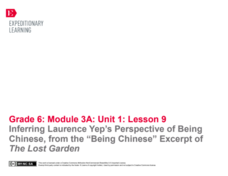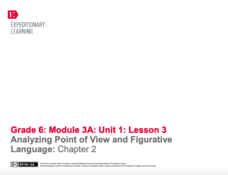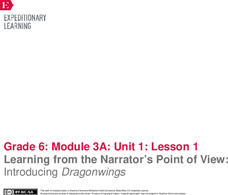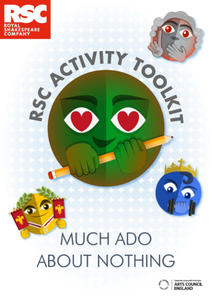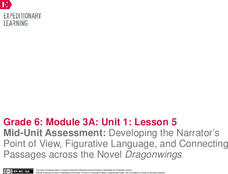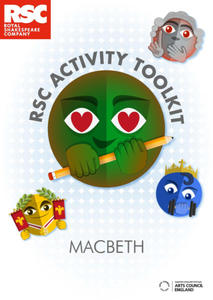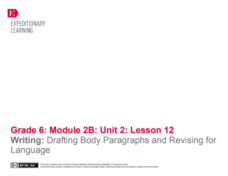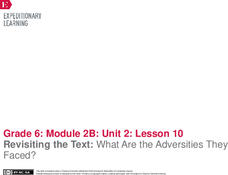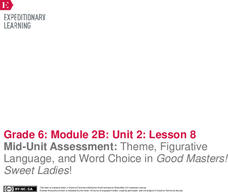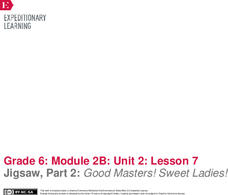EngageNY
Inferring Laurence Yep’s Perspective of Being Chinese, from the “Being Chinese” Excerpt of The Lost Garden
It's all about perspective! Using the resource, scholars read a third excerpt from Laurence Yep's autobiography, The Lost Garden. As they read, individuals complete graphic organizers using clues from the text to infer the author's...
EngageNY
Finding Evidence of Laurence Yep’s Perspective of the Police in Dragonwings
Perspective is everything. Using a graphic organizer, pupils determine Laurence Yep's perspective of the police in his novel Dragonwings. Additionally, scholars complete anchor charts to identify connotative language in the text.
EngageNY
Introducing The Lost Garden and Finding Evidence of Laurence Yep’s Perspective on What It’s like to Fit into Another Culture on Pages 66– 67 of Dragonwings
How does culture shape perspective? Pupils consider the question as they read an excerpt from Laurence Yep's autobiography, The Lost Garden. Using a graphic organizer, they gather textual evidence and make inferences about the author's...
EngageNY
Analyzing Point of View and Figurative Language: Chapter 3
Get to the point ... the point of view, that is! Pupils analyze Laurence Yep's Dragonwings for tone, figurative language, and point of view by completing graphic organizers. Scholars also read an excerpt from the novel and record the...
EngageNY
Analyzing Point of View and Figurative Language: Chapter 2
Just get to the gist. Scholars work in pairs to find the gist of an excerpt from Laurence Yep's Dragonwings. Pupils also complete graphic organizers to analyze the text for tone, point of view, and figurative language.
EngageNY
Learning from the Narrator’s Point of View: Introducing Dragonwings
Journey into the past with Laurence Yep's Dragonwings. Scholars complete anchor charts to analyze techniques the author uses to develop the narrator's point of view in his novel. As they read, pupils also complete word catchers to track...
Royal Shakespeare Company
King Lear Teacher Pack 2010
Every production of Shakespeare's plays is different—the director and designer must decide upon a theme. For his 2010 production, David Farr and his team decided to emphasize the conflicts that follow a regime change. The materials in a...
Royal Shakespeare Company
RSC Activity Toolkit: Much Ado About Nothing
Are you frustrated by searching for activities to engage readers in their study of Much Ado About Nothing? Sigh no more. Young thespians will find much to do in this Royal Shakespeare Company 23-page Toolkit. Included in the sections are...
Royal Shakespeare Company
RSC Activity Toolkit: The Merchant of Venice
Mercy! It's a wise teacher that knows their own students and what they need to appreciate Shakespeare's Merchant of Venice. A 28-page tool kit ensures that every scholar will play a part. The kit is divided into 20 sections, each of...
Royal Shakespeare Company
RSC Activity Toolkit: Romeo and Juliet
Is your head beating as if it would break into twenty pieces looking for activities to accompany a reading of the woeful tale of Juliet and her Romeo? Here's a weighty tool kit that won't hurt your back. The packet is divided into 20...
EngageNY
Inferring Laurence Yep’s Perspective on the Police, from the Crime in the Neighborhood Excerpt of The Lost Garden
Gist get to the point! Pupils read another excerpt from The Lost Garden, author Laurence Yep's autobiography. Working with partners, scholars annotate the text to look for the gist and record unfamiliar vocabulary in their word catchers.
EngageNY
Mid-Unit Assessment: Developing the Narrator’s Point of View, Figurative Language, and Connecting Passages across the Novel Dragonwings
Let's get creative! As part of a mid-unit assessment, scholars create a piece of artwork illustrating the theme from Laurence Yep's novel, Dragonwings. Additionally, pupils use a graphic organizer to identify figurative language in the...
EngageNY
Analyzing Point of View and Figurative Language: Chapter 1
Check out the view! Scholars complete a graphic organizer to analyze how Laurence Yep develops a character's point of view in Dragonwings. Additionally, pupils re-read parts of the novel and annotate the text on sticky notes, looking for...
Royal Shakespeare Company
King Lear Teacher Pack 2016
Disguises, deceptions, destruction. Thankless children, wise fools, aging rulers, and knaves. The Royal Shakespeare Company's 2016 King Lear Teacher Pack provides instructors with a wealth of resources for a study of Shakespeare's famous...
Royal Shakespeare Company
RSC Activity Toolkit: Macbeth
Are you looking for great activities to incorporate in a unit study of the Scottish play, Macbeth? You need not prick your thumb leafing through pages of ideas; instead, something marvelous your way comes in a 20-activity toolkit from...
University of Wisconsin
Don Quixote in Wisconsin
Are you looking for background information on Cervantes and his Don Quixote? How about a study guide and discussion questions or project ideas? Even journal prompts, tests, and quizzes? A 98-page teaching guide simplifies the quest with...
EngageNY
Analyzing and Discussing: Modern Voices
This is the way we go to school. Scholars take a look at two poems about different ways to get to school, TyrannosaurBus Rex and Point A to Point B. Pupils work in triads to analyze the poem images and determine the theme.
EngageNY
Launching Modern Voices: Concrete Poetry
Challenges are different for today's kids. Learners begin to think about their own challenges by examining the adversities faced by children in medieval villages. They complete a graphic organizer as they watch the video Hackschooling...
EngageNY
Writing: Drafting Body Paragraphs and Revising for Language
This is a formal affair. Scholars take a look at using formal writing in essays. They analyze the model essay Are We Medieval?: Opportunities in the Middle Ages and Today? They then begin working on the first draft of their own essays.
EngageNY
Examples from Life Today
Does that happen in real life? Scholars look at their Themes of Adversity graphic organizers and think of examples in today's world for each type of adversity. They determine if today's world has the same struggles as those in the Middle...
EngageNY
Revisiting the Text: What Are the Adversities They Faced?
Where's the evidence? Scholars take a look at the evidence section of a Literary Argument Essay Rubric. They discuss terms used in the rubric and then begin thinking about collecting evidence for their own essays. They also revisit their...
EngageNY
Qualities of a Strong Literary Essay
Put it all into words. Scholars work toward writing an argumentative essay. They begin by examining and marking strong words in Are We Medieval? A Literary Argument Essay Prompt. Learners then use Qualities of a Strong Literary Argument...
EngageNY
Mid-Unit Assessment: Theme, Figurative Language, and Word Choice in Good Masters! Sweet Ladies!
Time to show what you know. Scholars complete a mid-unit assessment to demonstrate their learning from the past lessons. Learners work independently to identify the theme and answer questions about Pask, the Runaway. They also examine...
EngageNY
Jigsaw, Part 2: Good Masters! Sweet Ladies!
Three heads are better than one. Scholars gather back in their triads for another read of their monologues. They answer text-dependent questions and review their work. Learners then present their jigsaw monologues to the rest of the class.


